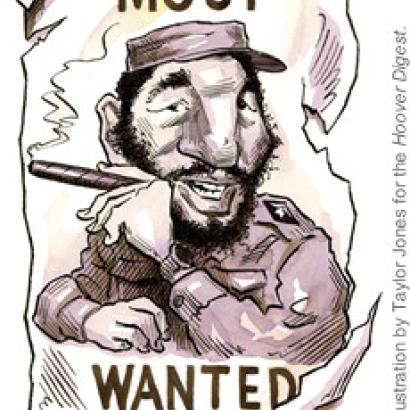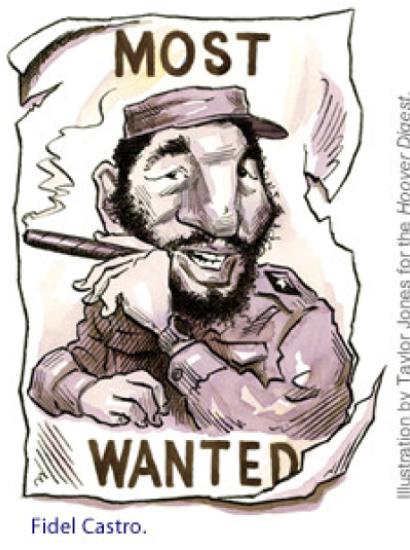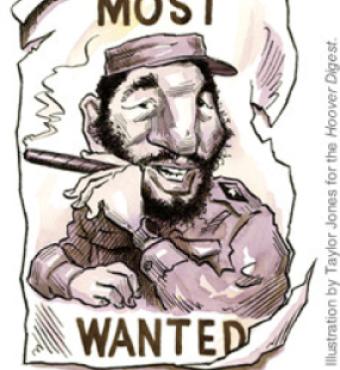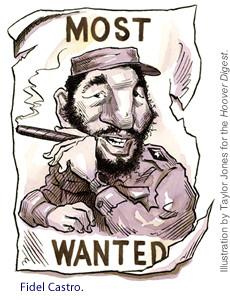- Economics
- International Affairs
- US Foreign Policy
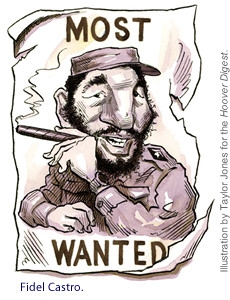
More and more Americans are asking how the United States can come up with a realistic policy toward Cuba during the remainder of Fidel Castro’s seemingly interminable lifetime. The underlying problem with our policy today is that while its objectives are desirable, they cannot be realized with the resources we are willing to commit. That means that no matter how much we and the Cuban people want Castro out, and no matter how much we support democracy, human rights, market reform, and a peaceful transition, in reality nothing we are doing today contributes significantly to the achievement of any of these outcomes. In fact, since the end of the Cold War our policy has been about as effective as our earlier comical efforts to make the dictator’s beard fall out. Our policy is a plodding example of how a legitimate lobby (militant Cuban-Americans, especially in Miami) and its political target (U.S. political parties seeking money and votes, especially in Florida) can to some degree reach their own goals at the expense of the general populations of two countries.
Decades of Soviet and U.S. policies toward Cuba have shown that Castro is his own player and will not change his game more than temporarily to suit even a big foreign bidder. Therefore, unless we are willing to force regime change violently, we will just have to endure Castro until he dies. That is what the vast majority of the Cuban people have decided to do. No one likes such a passive policy, but the alternatives, such as what we have been doing or greater intervention, are worse. With this in mind, rather than seeking to heighten tensions across the strait, as we do now, we should try to reduce conflict in order to make life a little easier for the Cuban people in the interim and actually improve the prospects of a more peaceful transition in the post-Castro period. The easiest way to move in this direction is to increase personal and other contacts between the two countries. At very long last, in late 2003 a substantial majority of legislators from both parties in both houses of Congress voted to do just that by easing travel restrictions. But, alas, a clique of Republican legislators in conference committee, contemptuous of the popular will, struck out the provision, which the president had vowed to veto in any event. This is the kind of political skullduggery that gives the political profession its bad image. The good news, however, is that the majority of the American people and their legislators now support change, and in time they undoubtedly will rout the minority.
From the beginning, we must recognize three things: (1) We still do have legitimate concerns about what Castro is up to; (2) our misguided policy is bipartisan; and (3) the embargo causes us and the Cuban people more problems than it does Castro. Beginning with number one, the issues that warrant attention include whether Castro is obstructing the war on terrorism, involved in the trans-shipment of drugs and money-laundering, developing a germ warfare capacity, and nurturing anti-Americanism across Latin America. To the extent that he is doing some or all of these things, we would be able to monitor and counter them better with more rather than fewer people of all sorts on the island. An embargo targeting the entire country is a blunt instrument against the possible activities of a tiny elite. We should instead bomb Havana with Big Macs, that is, increase the American presence there in every possible way.
Second, our current policy is bipartisan. The most militant spokesman for the embargo today is President George W. Bush, but during the 1990s it was President Bill Clinton. In 1992 it was presidential candidate Clinton who got our post–Cold War policy going in the wrong direction by supporting the legislation of former New Jersey senator Robert Torricelli that tightened the embargo, a policy then-president George H.W. Bush had wisely opposed. And in 1998–99, toward the end of his time in office, it was Clinton again who killed the proposed Presidential Bipartisan Commission on Cuba. The idea of a commission to review U.S. policy was conceived by former undersecretary William Rogers and endorsed by former secretaries of state Henry Kissinger, George Shultz, and Lawrence Eagleburger, along with many members of Congress and others.
Finally, since the end of the Cold War the embargo has been largely a vote-getting, feel-good stunt rather than a serious international policy. It has not caused Cuba’s main political, economic, or other problems. Cuba’s problems are the entirely predictable consequences of Castro’s own flawed and self-serving decisions. Today almost every country in the world has political and economic relations with Cuba, but Cuba produces almost nothing anyone abroad wants to buy and has very little money to buy what others produce. Ironically, according to polls conducted in the Miami area by Florida International University (FIU), only slightly more than 25 percent of Cuban-Americans themselves think the embargo really works, though a majority wants to continue it nonetheless. A character in Cuban novelist Pedro Juan Gutierrez’s Dirty Havana Trilogy remarks that she is “pained to witness so much poverty and so much political posturing to disguise it.” One should only add that the embargo is also sustained by massive moral posturing and that although Gutierrez was speaking of posturing in Cuba, this same quality pervades support for sanctions in the United States. To the degree that the embargo does have a real impact, however, it is mainly negative on the lives of ordinary Cuban people and on our international stature.
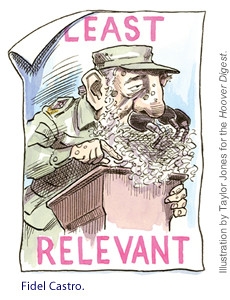
Why the Embargo Doesn’t Work
In the post–Cold War period, the embargo has become a strategic liability. Even though most embargo supporters say the sanctions are intended to promote a peaceful transition, in fact they heighten tensions and hardships for the Cuban people and exacerbate differences among Cubans in Cuba and with those in exile. Our policy encourages conflict and instability and, to the degree that it succeeds, could promote a violent uprising or even civil war. (A few embargo supporters quietly admit they want war to clean out the flotsam and jetsam of the Castro period.) But if the democratic forces do rise up against Castro, which is unlikely in the foreseeable future, and are in danger of being crushed by Castro’s repressive apparatus, which is highly probable, the U.S. government would be under heavy pressure to intervene militarily to rescue the reformers. FIU polls show 61 percent of Cuban-Americans want U.S. military intervention, as do a few militant gringo politicians. Most Americans, however, emphatically including officers of the U.S. armed forces I have talked to at many levels, wisely oppose this course of action.
The Helms-Burton Law, the heart of our current policy, is destructive of U.S. interests because it makes demands on the current and future governments of Cuba that are imperialistic, logically inconsistent, and counterproductive. Helms-Burton is a new Platt Amendment, 100 years after the first. Mark Falcoff of the American Enterprise Institute has noted correctly that the original Platt Amendment—the 1901 agreement that in important respects made Cuba a U.S. dependency—planted “seeds of a long smoldering resentment” in Cuba and that Helms-Burton is doing the same.
Cuba is no military or economic threat to the United States, but our policy there is destructive of what Joseph Nye has called our “soft power” worldwide, that is, the international goodwill that persuades other nations to cooperate with us in matters of real importance, such as the war on terrorism. International polls, confirmed by my recent personal experiences on four continents, tell us that America’s image around the world today is low and that hostility toward us is rising. Much of the hostility results from what foreigners consider our bullying of other nations, exemplified in particular by Bill Clinton’s bombing of Yugoslavia in 1999 and George W. Bush’s invasion of Iraq in 2003. Thus although Cuba is not a major cause of our current reputation, it fits what critics consider to be our objectionable and dangerous style. A unilateral lifting of the embargo should relax tensions on the island and improve our image, especially in Latin America, where regard for the United States is plummeting.
Some embargo supporters say lifting the embargo now would reward Castro for his stubbornness and brutal repression in early 2003. No. We must announce that Castro simply has been dumped from our “most wanted” to our “least relevant” list. His international admirers would shout “Viva Fidel! Hasta la Victoria Siempre,” but the rest, or at least those few who notice, would just say, “Good Lord, it’s about time.”
On the other hand, the embargo feeds Castro’s soft power. It gives him a scapegoat for his repression and economic failures, and it also refurbishes his image as the enduring scourge of American imperialism, the central drive and purpose of his entire career. If we take this scapegoat from him, it will be a major step toward killing him while he is still alive. One of the tragic and bitter ironies of the embargo is that those who most hate Castro are the ones who most relentlessly and effectively feed his insatiable ego and sustain his international image.
Many embargo supporters note that the dollars Cuba draws from investments, trade, and tourism support repression and therefore should be kept from the island. Yes, some do, but many also pass through the hands and lives of millions of Cubans, giving them hope for survival in a destitute economy. If that isn’t so, why do so many Cubans dig so hard to find any kind of freelance work to earn a few greenbacks? Even Cuban-Americans know this is true when they set their passions aside for a moment, which is why they are the main ones who shatter the spirit of the embargo by using a legal loophole that allows them to send remittances to family and friends on the island. Cuban-Americans now send an estimated $1 billion per year to Cuba. All of these dollars, the island’s main source of foreign currency, also funnel into Castro’s hands, and many support the repressive apparatus. Therefore a really honest embargo would forbid the sending of any dollars to Cuba. Cutting all dollars to the island would reduce almost everyone to serious poverty and, more than anything we can do short of an invasion, might indeed spark an uprising against Castro. In my judgment, the remittances are humanitarian acts that should continue, but they shatter the logic of the sanctions regime. One important result of the general tourism industry is that it makes at least some dollars available to many Cubans who have no family abroad, thus reducing somewhat the increasingly explosive divide between classes of Cubans, namely those who have dollars and those who do not.
Finally, has the embargo improved human rights? Embargo supporters say they champion human rights, thus trying to seize the moral high ground in the debate over the embargo. In fact there is more evidence to the contrary. Embargo supporters say the arrests, trials, and executions of March and April 2003, which I witnessed firsthand while leading educational tours (now banned) of the island, prove that the moderate engagement line of the Europeans has failed. But if anything the repression proves that our policy of assisting the dissidents has backfired. The arrests and imprisonments were a severe blow to the pro-democracy movement. For almost 45 years Castro has shown that neither threats nor enticements, from the former Soviet Union in the past or from Europe or us today, will move him more than temporarily closer to policies he does not support. Castro is like T. S. Eliot’s Rum Tum Tugger, if we paraphrase thusly: “Fidel Castro will do, as Fidel Castro do do, and there’s no doing anything about it.” So unless the United States is prepared to go in and take Castro out, Cubans must just find a way to survive his rule, as they have already done for decades, and so must we.
Constructive Engagement
Two years ago I spent a long evening with Cuban dissidents Elizardo Sanchez, Oscar Espinosa Chepe, Mirian Leyva, and Hector Palacios. (Chepe and Palacios are now serving decades-long prison terms.) Palacios, who had recently polled dissidents on the island, found that 90 percent wanted the embargo lifted. Why? Because, as Sanchez said, “isolation is oxygen to totalitarians.” And yet the United States is not only maintaining the embargo but cutting back on the number of Americans who can visit the island legally, thus increasing the isolation that is the oxygen to Castro’s totalitarian regime.
One might ask, who knows better how to deal with Fidel Castro? A few Cuban-American legislators who have lived in the United States for decades and represent militantly anti-Castro constituencies with their own understandable (but misguided) agendas and their declining supporters around the country? Or the people of Cuba, including the dissidents on the front lines and in jail? The latter, of course, and Cubans generally and the dissidents in particular want to see more Americans, not fewer, on the island. Embargo supporters, however, promise fewer visitors but more moral and material support for the dissidents. Two years ago, Palacios told me that dissidents are very uncomfortable with aid from abroad, particularly from Washington, even when they take it, because it “burns.” It certainly “burned” the 75 dissidents arrested in early 2003 because the Castro regime used contacts with the U.S. government and receipt of support from Americans to “prove” democratic advocates were agents of American imperialism.
Embargo supporters are quick to proclaim support for dissidents, or democratic reformers, when they condemn Castro’s repression or call for peaceful reform. The dissident most lauded by Americans today is Oswaldo Paya, who in 2002 won the European Union’s top human rights award (the Sakharov Prize) and in December 2003 published a detailed peaceful transition program for Cuba. Paya approved the United Nations General Assembly’s condemnation of the embargo in November 2003 (while fruitlessly calling upon the world body to simultaneously condemn Castro’s repression). If we Americans really admire courageous men and women like Paya, Palacios, and many others who stand up to Castro to demand a little more freedom, why don’t we show them the ultimate respect of doing what they ask of us? Why don’t we open the doors wider to Americans who want to visit Cuba or, better yet, lift the embargo altogether?








